Roll-Off Trucks: What They Are and How They Work
Discover what a roll-off truck is, how it works, and its vital role in waste management. Discover the various types and find the ideal truck for your needs.
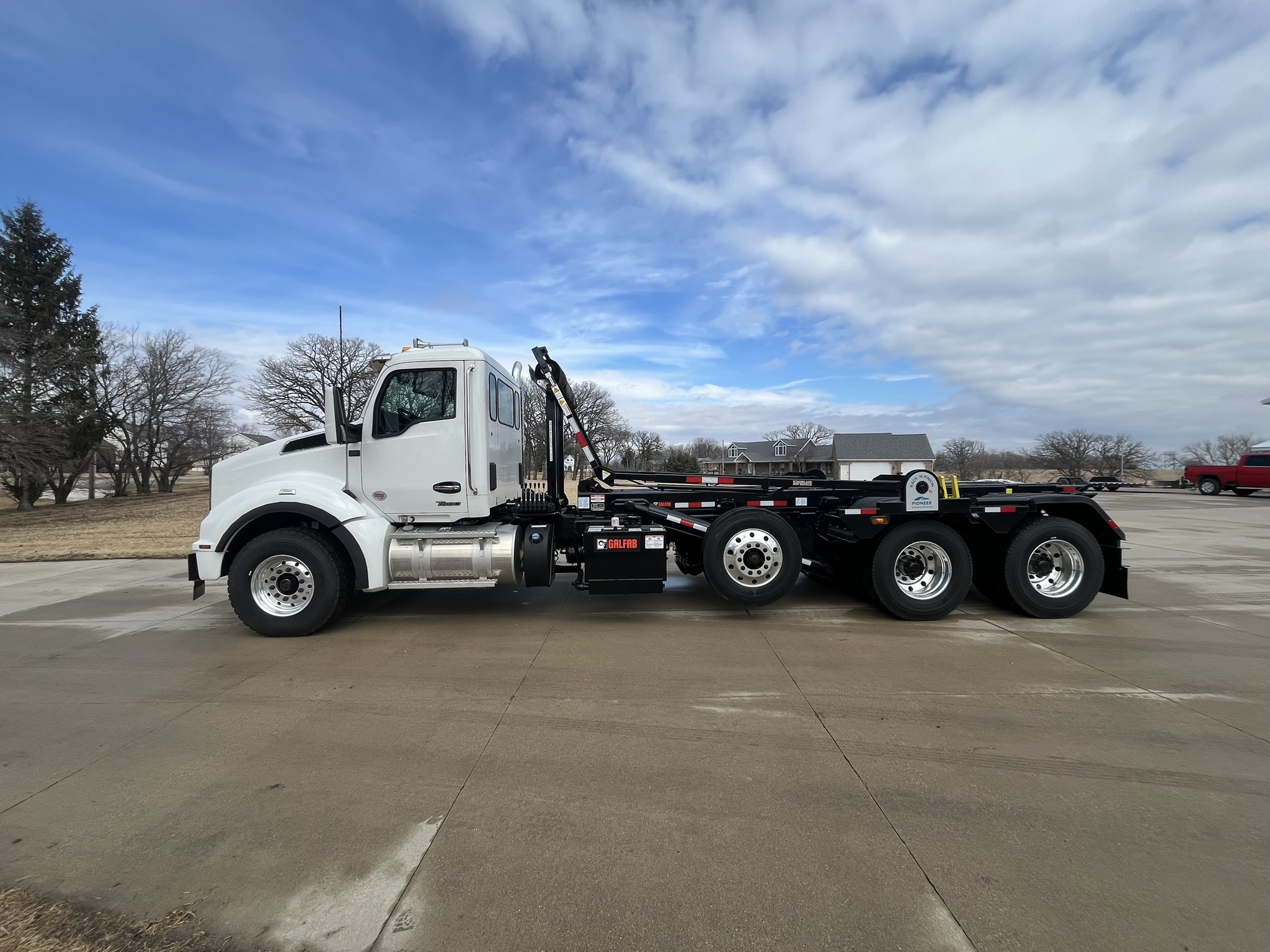
Discover what a roll-off truck is, how it works, and its vital role in waste management. Discover the various types and find the ideal truck for your needs.

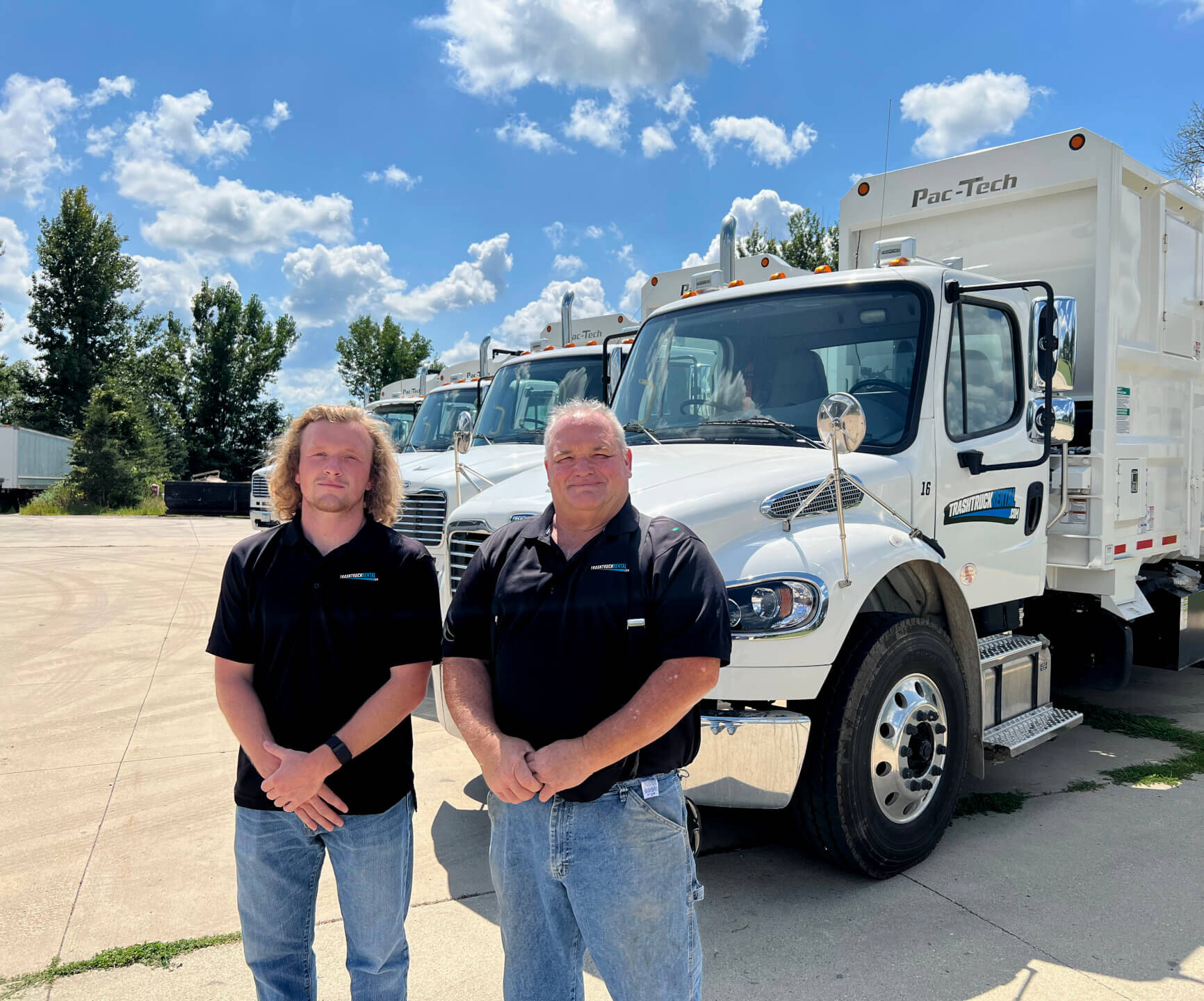
If you're running waste collection for a city, managing a private hauling business, or handling large-scale cleanup for a commercial site, you know how quickly debris pile up. Roll-off trucks are built to handle that load literally. These trucks are designed for heavy-duty jobs, making them essential for hauling construction debris, bulky waste, and full dumpsters safely and efficiently.
Most people don’t see what happens after a container is full, but you do. You need a truck that’s reliable, strong, and ready for nonstop work. That’s why roll-off trucks have become the backbone of waste operations across the country.
As of 2019, 60% of the U.S. waste industry depends on roll-off trucks to get the job done. Whether you serve a municipality, operate a private waste company, or support commercial clients, these trucks help keep your operations moving. Let’s explore how they work and how to get one that fits your needs.
Roll-off trucks are built to move large, heavy dumpsters loaded with waste from one site to another. You’ll recognize them by their long, rectangular frames and hydraulic systems that let containers roll on and off with ease. These trucks are essential when you’re dealing with bulky materials or high-volume jobs.
There are a few different types you should know:
Each type has its own advantage. The best choice depends on your routes, waste types, and how your team works on the ground.
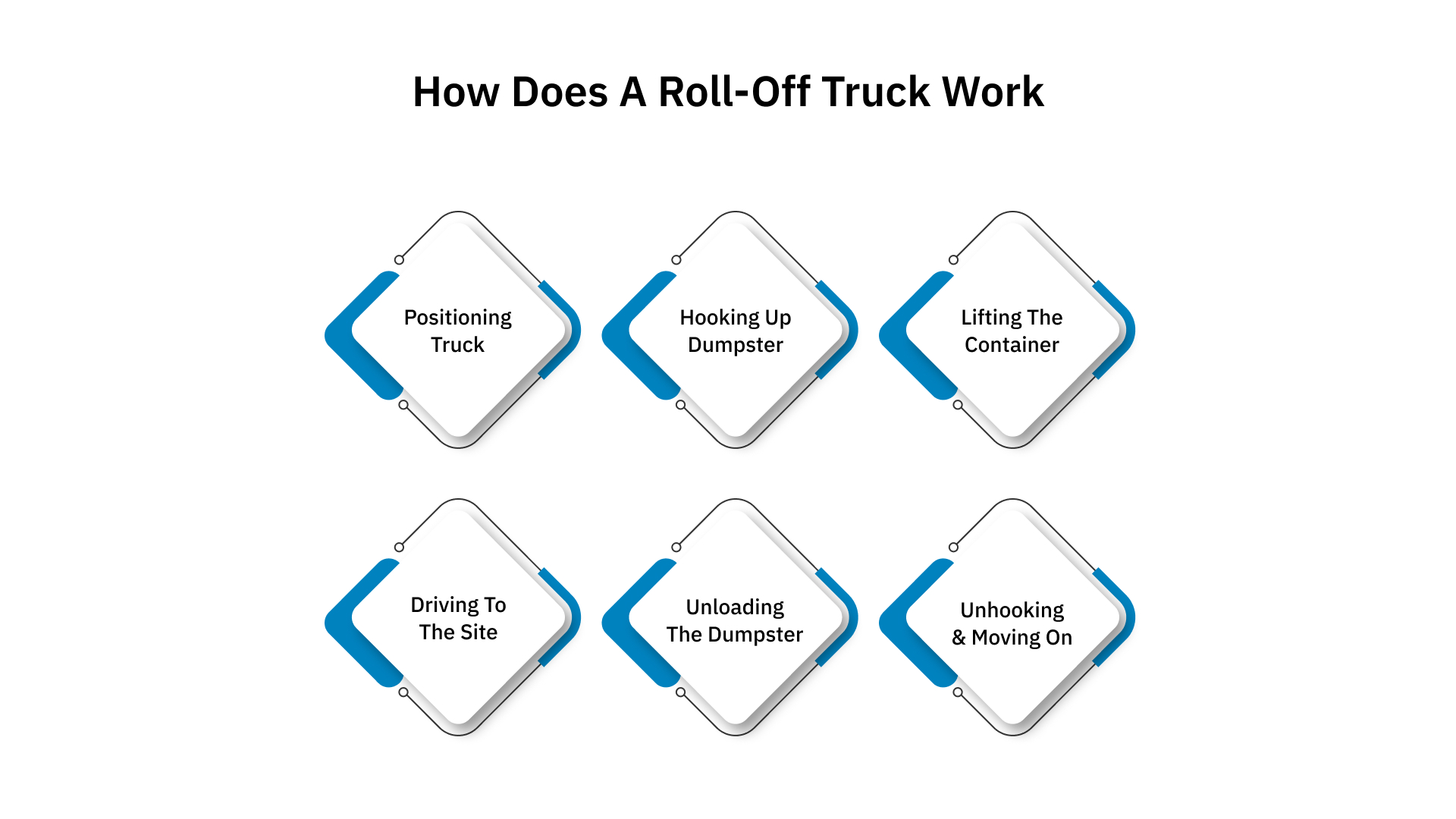
Roll-off trucks are engineered with hydraulic systems and secure locking mechanisms that enable safe and efficient loading, transport, and unloading of large dumpsters. Here’s a step-by-step look at the operation:
You start by parking the truck in the right spot so the container can be loaded or unloaded without issues.
Based on the truck type, hook-lift or cable hoist, you’ll attach the corresponding mechanism to the dumpster’s rear to secure it during loading.
Next, the hydraulic system activates, using pressure to smoothly pull or lift the dumpster onto the truck bed, ensuring stability to prevent shifting or damage during loading.
Once locked in place, the truck transports the dumpster to the drop-off or disposal site.
At the destination, the system rolls the dumpster off gently to keep everything stable and safe.
The hook or cable is released, and the truck is ready for the next job.
These trucks facilitate fast and safe waste transport, making them ideal for any large-scale project.
Now that you know how a roll-off truck works, let’s look at the different types you should be familiar with.
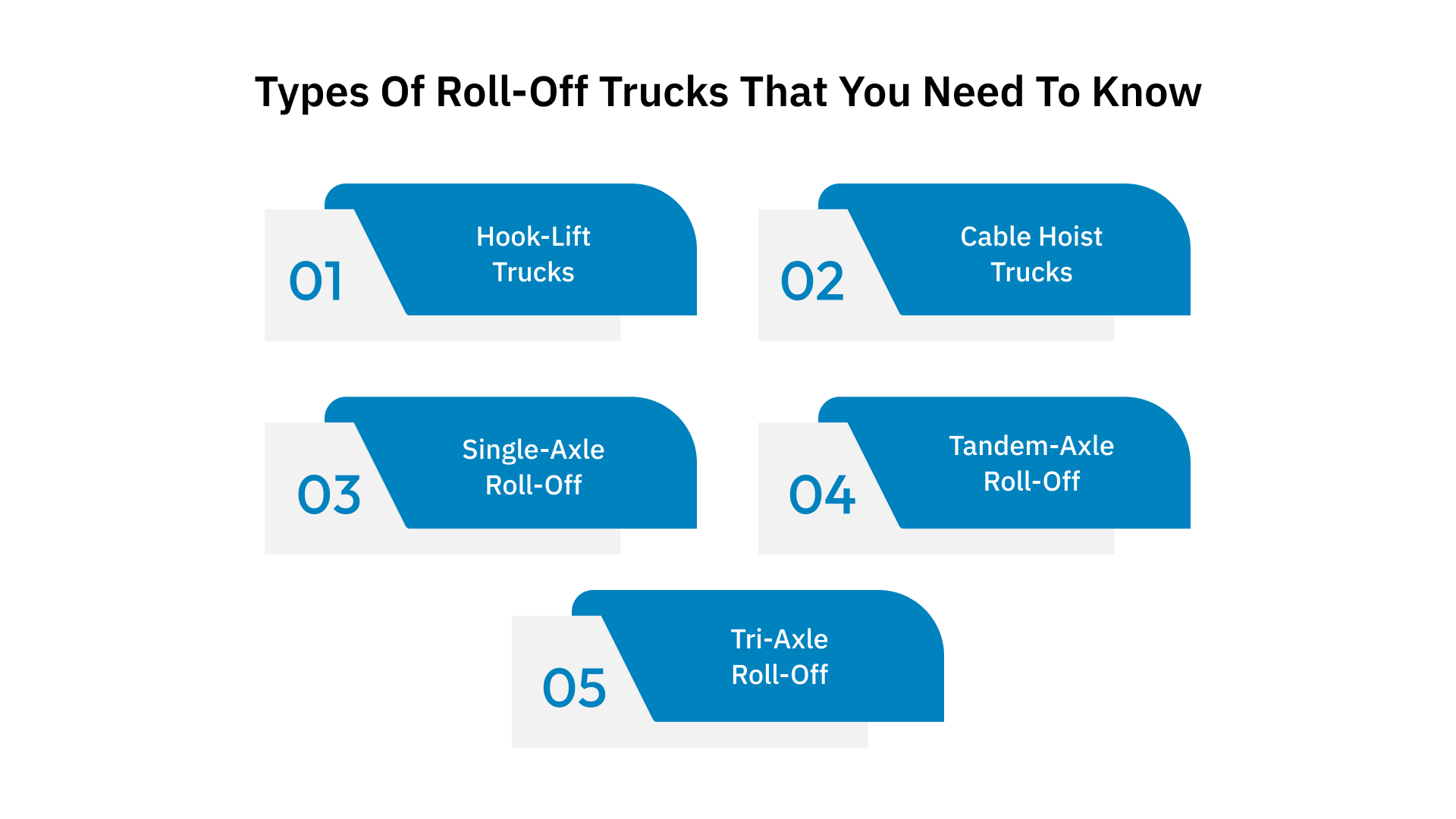
When you’re choosing the right truck for waste hauling, whether for a city contract, private hauling business, or large commercial job, it helps to know the main types of roll-off trucks and what they’re built for. All roll-off trucks are designed to load, transport, and unload dumpsters, but their operation and capabilities vary.
Best for smaller projects, these use a hydraulic hook system to pull containers (usually up to 20 cubic yards) onto the bed. They’re quick, easy to use, and great for jobs with tight spaces.
Built for heavier loads of 20 cubic yards and above, these models utilize a winch-and-cable system to pull the dumpster onto the truck. They're more versatile and suited for both residential and commercial sites.
These trucks feature a single rear axle, making them highly maneuverable and ideal for residential or smaller commercial jobs where space is limited.
Tandem-axle roll-off trucks feature two rear axles, providing greater weight capacity and stability, making them ideal for construction and large commercial waste applications.
Tri-axle roll-off trucks, with three rear axles, offer maximum legal weight capacity and stability, ideal for heavy construction debris and bulk industrial waste.
Some trucks combine features for more flexibility on the job. Knowing which type suits your operation helps you choose smarter whether you're renting, expanding your fleet, or replacing older equipment.
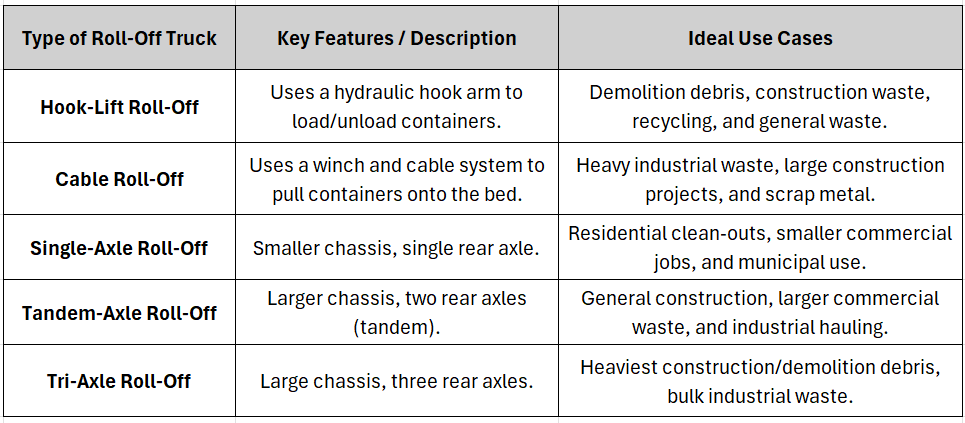
Finding the right roll-off truck for your project can make all the difference in staying on schedule and budget. Trash Truck Rental offers well-maintained roll-off truck rentals with flexible terms to match your operational needs. Request a quote or reach out to explore the best fit for your job.
Now that you are familiar with the different types of roll-off trucks, let’s look at how they can support and simplify your daily operations.
As someone responsible for keeping operations smooth, you need equipment that’s versatile, reliable, and built for heavy-duty work. That’s where roll-off trucks come in. They're used across industries to manage waste, improve efficiency, and support daily logistics.
If you're overseeing a city contract or coordinating cleanup after a major commercial project, you know how crucial dependable roll-off trucks are. Here’s how you might use them:
Roll-off trucks help you stay on schedule, reduce downtime, and manage waste safely, no matter the size or scope of your operation.
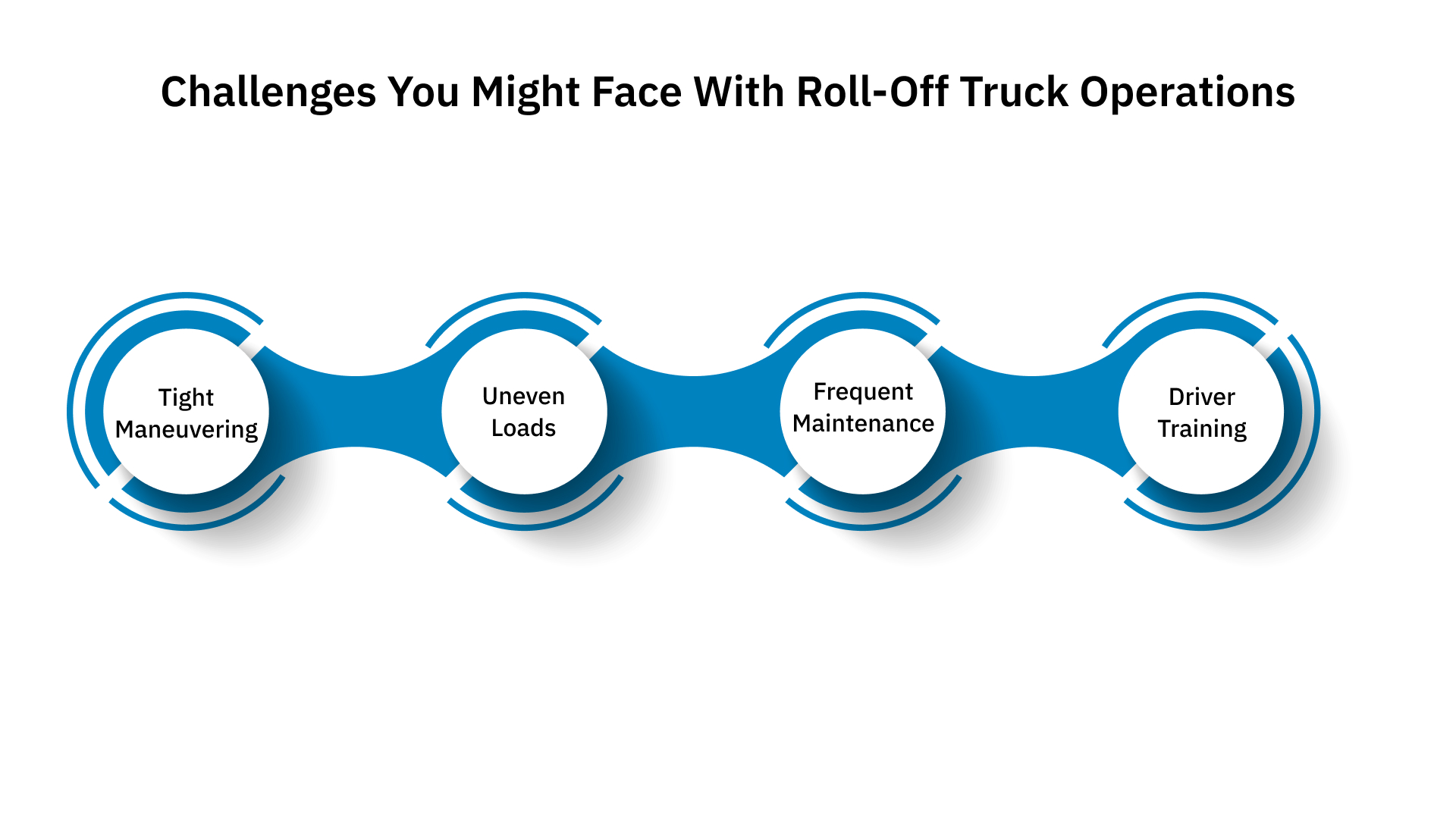
Roll-off trucks are powerful tools, but they come with real-world challenges. Knowing these can help you stay prepared and keep your fleet running smoothly:
Being prepared for these issues helps you choose more effective equipment and work with partners who understand your day-to-day challenges.
Whether you're new to roll-off hauling or scaling up your fleet, it's not just about having the right truck. It’s about running it safely, legally, and without costly surprises.
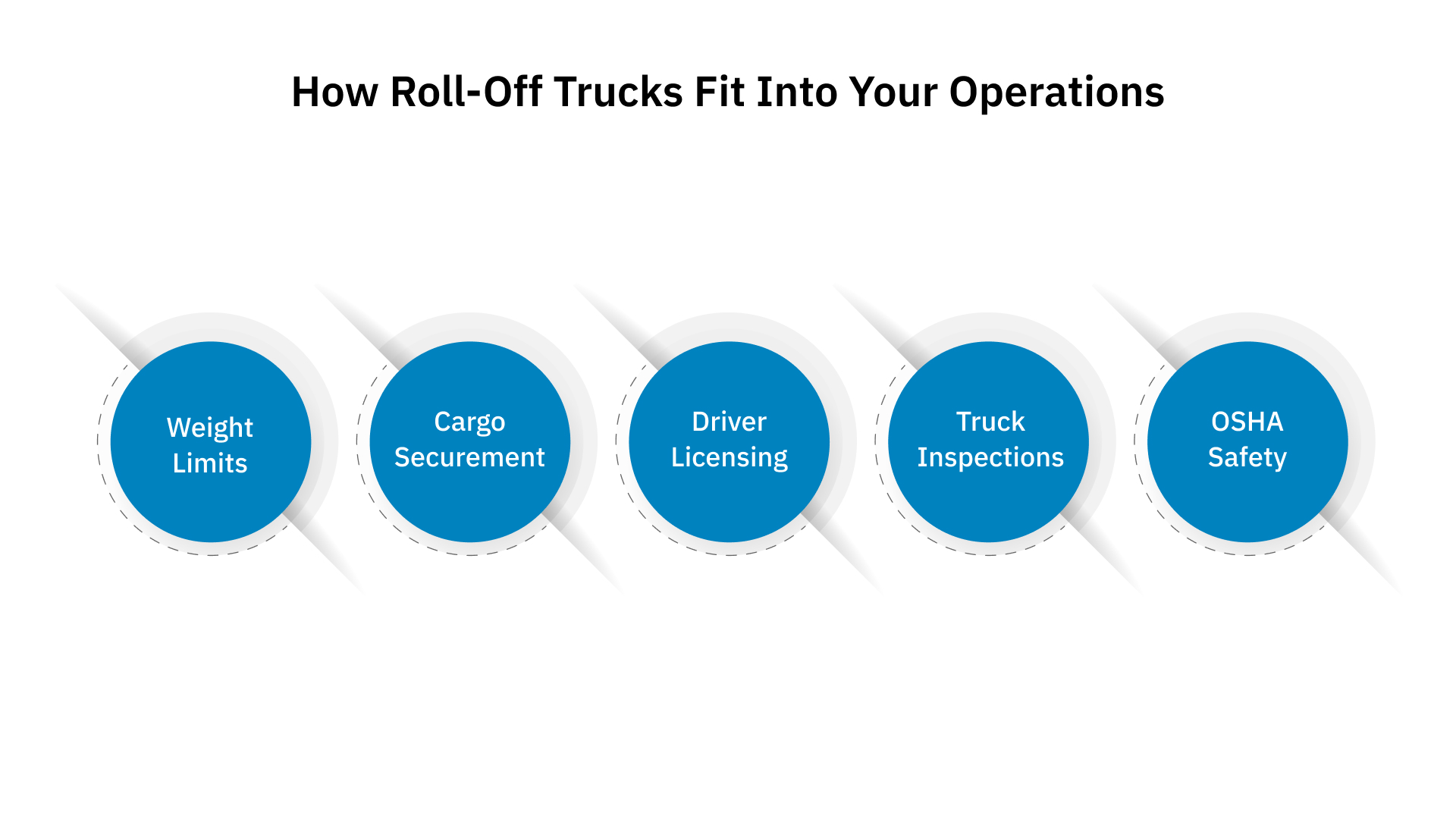
Running roll-off trucks means more than just moving waste; it means following strict rules to keep your team, the public, and your equipment safe. Knowing the basics helps you stay compliant and avoid costly problems.
Here’s what you need to watch:
Following these rules protects your business, your team, and your reputation. With Roll Off Garbage Truck Rentals by Trash Truck Rentals, you not only get reliable equipment, but you also support safer, more compliant operations.
Waste collection doesn't wait for perfect conditions. From unexpected breakdowns to shifting schedules, operations teams have enough on their plates. At Trash Truck Rental, we understand those pressures because we've been supporting municipal and private waste fleets for over 20 years.
Whether you're running a city sanitation department or managing a private hauling operation, the goal is the same: reliable trucks, fast support, and clear communication. That's precisely where we focus.
We provide roll-off trucks that are:
Our approach is simple; reduce your downtime and help you stay on track, even when plans shift. Our customers often mention how easy it is to work with our team and how dependable our equipment is on the job.
With 20 years in waste logistics, we bring more than just trucks. We offer real-world insight to help you:
Whether you're planning for seasonal demand or responding to urgent equipment needs, we're here with practical answers and reliable trucks.
We proudly serve operations across:
And if you're located elsewhere, we also offer nationwide sales of used roll-off, side-load, and rear-load garbage trucks.
Roll-off trucks aren't just equipment. They are the backbone of efficient waste operations. Whether you're managing municipal pickups, commercial construction sites, or large-scale cleanups, having the right truck in the proper condition directly affects your crew's safety, your timeline, and your bottom line.
But equipment alone isn't enough. You need a rental partner who understands regulatory demands, tight timelines, and the everyday unpredictability of waste operations. At Trash Truck Rental, we've spent over 20 years helping teams like yours stay compliant, reduce downtime, and keep moving.
From choosing the proper roll-off configuration to staying aligned with DOT requirements, we offer more than just trucks. We provide practical support built around your needs. In this line of work, reliability is not optional—it's essential.
If you're planning or facing a last-minute equipment need, Contact Trash Truck Rental to request a quote or talk with our team. We'll help you find the right solution without delay or complications.
Our minimum rental term is 28 days, with options to extend as needed. We also support long-term rentals for ongoing contracts, seasonal demand, or fleet augmentation.
Each rental includes a fully inspected, work-ready truck, scheduled maintenance support, and delivery updates. Customers are responsible for insurance, driver compliance, and basic daily checks. We keep the terms clear and straightforward.
We offer leasing and sales nationwide, with our headquarters based in Minnesota.
We perform rigorous inspections before delivery, but if an issue arises, contact our support team immediately. We prioritize fast resolution based on your location and the details of the breakdown.
Ready to Upgrade Your Process Operations?